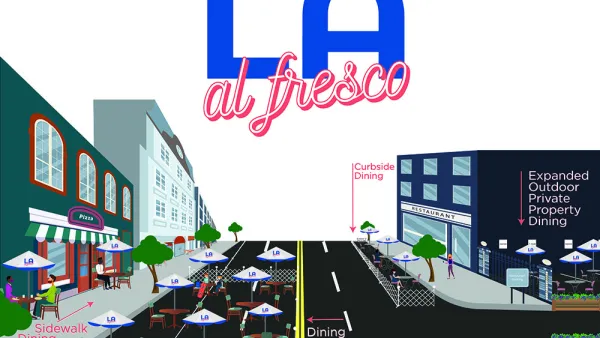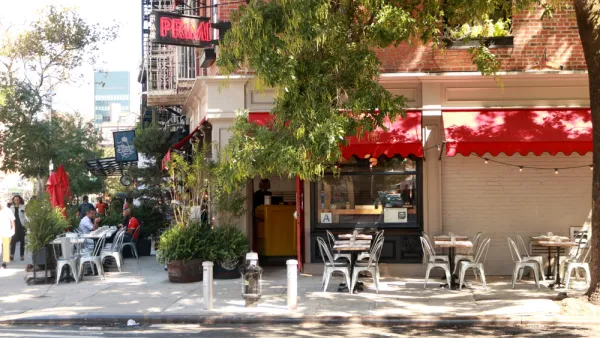The pandemic-era outdoor seating arrangements can stay, but a last-minute amendment lets business owners close them overnight.

San Francisco's Board of Supervisors "approved a modified version of the ordinance regulating the Shared Spaces program to allow mostly small businesses to continue to use public sidewalks and parking spots to bolster their businesses — and to close those spaces at night," marking a tempered victory for proponents of the "pandemic parklets" that sprang up over the last year and a half.
As reported by J.K. Dineen and Mallory Moench, despite arguments that keeping them open at night would preserve public space, the supervisors decided to allow businesses to close the parklets at night, citing concerns about noise and vandalism. "Over the past several months, the parklet program has come under scrutiny as elected officials grappled with how to regulate the hundreds of outdoor spaces that provided a lifeline for small businesses during the pandemic. In particular, board members sought to make sure that parklets would be accessible to disabled people and debated privatizing public space permanently."
Under the new rules, "[m]om-and-pop businesses will enjoy a two-year fee waiver for the program to help in economic recovery. The fees range from $1,000 to $3,000 for a single parking space, depending on the type of parklet, and will be required for formula chain stores."
FULL STORY: San Francisco's parklets are here to stay, but supes say they can close overnight

National Parks Layoffs Will Cause Communities to Lose Billions
Thousands of essential park workers were laid off this week, just before the busy spring break season.

Retro-silient?: America’s First “Eco-burb,” The Woodlands Turns 50
A master-planned community north of Houston offers lessons on green infrastructure and resilient design, but falls short of its founder’s lofty affordability and walkability goals.

Delivering for America Plan Will Downgrade Mail Service in at Least 49.5 Percent of Zip Codes
Republican and Democrat lawmakers criticize the plan for its disproportionate negative impact on rural communities.

Test News Post 1
This is a summary

Test News Headline 46
Test for the image on the front page.

Balancing Bombs and Butterflies: How the National Guard Protects a Rare Species
The National Guard at Fort Indiantown Gap uses GIS technology and land management strategies to balance military training with conservation efforts, ensuring the survival of the rare eastern regal fritillary butterfly.
Urban Design for Planners 1: Software Tools
This six-course series explores essential urban design concepts using open source software and equips planners with the tools they need to participate fully in the urban design process.
Planning for Universal Design
Learn the tools for implementing Universal Design in planning regulations.
EMC Planning Group, Inc.
Planetizen
Planetizen
Mpact (formerly Rail~Volution)
Great Falls Development Authority, Inc.
HUDs Office of Policy Development and Research
NYU Wagner Graduate School of Public Service





























